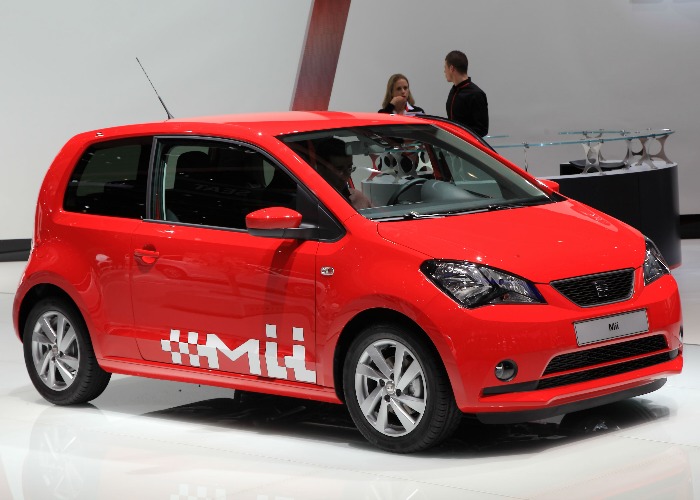Cheapest cars to own – including fuel, insurance, tax and servicing

Spending a little more on your car up front could pay off in the long run, with new data showing the total cost of owning different cars over a six-year period.
The Seat Mii is the cheapest car to own over a six-year period, according to new data from a price comparison site.
Costing £10,560 initially, the Mii will end of costing you £15,513 once the cost of fuel, insurance, tax, MOT and servicing over an average six-year lifespan is taken into account.
If you’d tried to save a few hundred pounds by buying the cheaper Volkswagen Up! you would end up spending almost £1,000 more over six years due to higher insurance premiums.
Both cars compare favourably with an average of £37,554, claims Moneysupermarket, which analysed 200,000 vehicles registered in the UK.
Luxury vehicles including Ferraris, Bentleys and McLaurens were unsurprisingly the most expensive cars to own, costing up to 20 times more.
It also surveyed car owners on how much they spend on maintenance, finding that Brits underestimated their annual expenditure by around £750.
MoneySuperMarket has designed an online tool where you can work out the cost of your car over its lifetime.
The cheapest cars over six years
These are the cheapest cars over a six-year period, according to MoneySuperMarket.
Bear in mind that these figures come from existing vehicles. It’s therefore possible that initial prices may be higher or lower than those quoted and that fuel and insurance costs could vary considerably.
|
Model |
Initial Cost |
Total Cost of Fuel over Lifetime |
Insurance Premiums |
Tax |
MOT |
Servicing |
Total Cost |
|
SEAT MII |
£10,560 |
£2,275 |
£940 |
£833 |
£162 |
£744 |
£15,513
|
|
VOLKSWAGEN UP! |
£9,685 |
£891 |
£3,950 |
£833 |
£162 |
£744 |
£16,444 |
|
SUZUKI CELERIO |
£9,530 |
£1,539 |
£2,724 |
£714 |
£162 |
£744 |
£15,412 |
|
PEUGEOT 108 |
£11,373 |
£1,705 |
£1,984 |
£714 |
£162 |
£744 |
£16,681 |
|
FORD KA+ |
£10,312 |
£4,378 |
£1,946 |
£952 |
£162 |
£744 |
£18,493 |
Saving money on fuel
Fuel prices are rising, up to £1.21 per litre for unleaded and £1.24 for diesel in April, according to the AA.
Industry experts have predicted further rises this year, making it more important to save money when filling up.
It is possible to compare prices at your local petrol stations on PetrolPrices.com.
Using the right credit card and joining loyalty schemes can also make a difference, as can improving the efficiency of your car.
Read our full guide to reducing fuel prices here.
Cheaper insurance
At an average cost of £493, insurance is a huge chunk of the cost of running a car.
Your choice of car can dramatically affect the price you’ll pay for insurance.
In separate research, comparison website Comparethemarket looked at thousands of insurance quotes and compiled a list of the cheapest cars to insure, which you can view here.
Confusingly, the cheapest cars to insure differed from the overall cheapest cars list above, with the Skoda Yeti topping this particular list.

No matter what car you own, you should always shop around for insurance; in fact, the gap between the average and cheapest premiums is now at record highs of £129.
LoveMONEY has compiled a full guide to getting cheaper car insurance.
Cut the cost of servicing
Bills from car repairs can run into the thousands of pounds and some cars are simply more prone to breaking down than others.
Just Tyres looked at both the most and least likely cars to break down, and how much the average repair cost for each.
Again, the list of reliable and cheap to repair cars is different from MoneySuperMarket’s list above.
According to Just Tyres, the Toyota iQ is the most reliable car available, with repair costs of £224 on average.
In comparison, repairs for the breakdown-prone Nissan GT-R come to a whopping £3516.

Don’t forget about depreciation
Buying and running a car is, clearly, a costly experience.
However, you can hopefully make some of your money back when you sell the car.
Getting the most when you sell your car means minimising depreciation. Tim Pickering from GO Vauxhall recently wrote for LoveMONEY, explaining how you can reduce depreciation.
He also suggests that buying a used car could provide better value overall.
You can read Pickering’s article here.
Read more from loveMONEY on saving money on motoring and travel costs.
Comments
Be the first to comment
Do you want to comment on this article? You need to be signed in for this feature